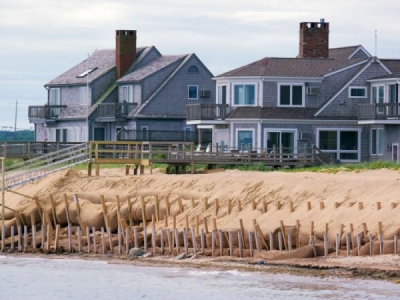
Posted on September 15, 2020
Sandwich Town Manager George H. (Bud) Dunham is asking three federal legislators to help secure an ongoing source of sand to beef up Sandwich’s eroded beach and, in turn, to save historic village areas from potentially devastating storm surges.
“Under heightening climate change conditions, these continued erosional pressures have reached a critical stage that have resulted in unacceptable risks to important town services, property and infrastructure as well as scores of private homes,” Mr. Dunham stated in a strongly worded letter to Sandwich’s federal delegation. “We are hereby requesting your assistance in addressing the long-term nature of this problem.”
The letter was sent last week to US Senators Elizabeth A. Warren and Edward J. Markey, as well as US Representative William R. Keating.
Specifically, Mr. Dunham was asking the legislators to help expedite an anticipated beach replenishment project from the US Army Corps of Engineers and to tweak an existing Cape Cod Canal dredging contract from the army corps to allow dredged sand to be distributed on Town Neck Beach rather than dumped into the ocean.
The request to the members members was timed to coincide with the release of a report from the army corps that will show the Cape Cod Canal and the stone jetties leading into it from the Cape Cod Bay have caused sand starvation to Sandwich’s beach.
A draft of the “111 Study” is expected to be presented to the board of selectmen at its Thursday, October 8, meeting, Mr. Dunham said yesterday. The Sandwich Board of Selectmen had hoped to hear the report next week, but they have learned to hurry up and wait when dealing with sand replenishment efforts.
“The town has been working with the army corps for over 15 years to confirm what has long been suspected, that the canal itself is the primary cause of the dramatic erosion along Town Neck Beach, and to develop a long term strategy for mitigating damages to public,” Mr. Dunham wrote.
Although the army corps is expected to partially remedy the situation—by depositing about $12.5 million worth of sand on Town Neck Beach—this will only be a one-time replenishment, Mr. Dunham explained, which, he said, is not enough.
“Due to the perpetual nature of the problem, with erosion continuing as long as the canal continues to exist, frequent renourishment will be required for an engineered beach project to perform as intended over time,” the town manager wrote. “The corps has acknowledged this need, but they have also confirmed that due to funding constraints associated with the Section 111 authority…they will not be able to participate in any long-term renourishment of the proposed beach solution. Consequently, this study, albeit a step in the right direction, will fail to result in the long-term solution we had hoped to achieve knowing the negative erosion impacts of the canal will continue indefinitely.”
But the federal congress members can ask that the $12.5 million ceiling on federal funding be increased and ensure the replenishment project takes place as quickly as possible, Mr. Dunham said in his letter.
Following the release of the 111 report, there will be a public comment period, and those comments will be taken into consideration before the final report is issued, hopefully at the end of the year, Mr. Dunham said.
Mr. Dunham is asking federal legislators to issue letters of support during that public comment period.
The town manager also spelled out the request for help in amending the existing Cape Cod Canal dredging contract.
He suggested that the legislators “encourage the Corps to amend its operations and maintenance (O&M) dredging protocol” so that dredged sand will end up on Town Neck Beach.
“Placing this material on Town Neck Beach will help mitigate coastal storm risk and significantly extend the useful life expectancy of the engineered beach project being recommended by the Section 111 study,” Mr Dunham wrote.
The corps is expected to offer to place some 388,000 cubic yards of sand on Town Neck Beach. The sand will come from a sand-rich spot just offshore at Scusset Beach.
“We cannot stress enough how imperative it is for us to receive your support on this effort, as the future of a major portion of our community depends on it,” Mr. Dunham concluded. “The town and your offices have patiently waited for the Section 111 process to reach its conclusion. Now that this milestone is upon us, we all need to act swiftly and decisively.”
Mr. Dunham said yesterday he had not yet heard anything back from the federal legislators, but he did not expect them to comment before the 111 study is released.
Source: capenews





